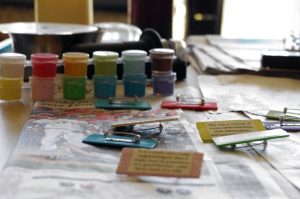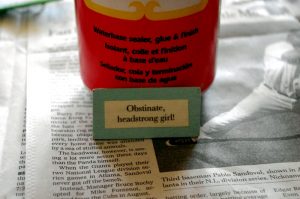The first thing I’m going to do is warn you that this post is going to be fairly lengthy. I’ve been attempting to outline it in my head for nearly a week now but it is going to be a brain dump; this is not going to be as organized or methodological as the prior pieces in the series.
Second thing I’m going to tell you is that this is going to be probably fairly raw and really personal. Last thing I want to point is that I’m not bitter or cynical.
Really.
I’m just incredibly frustrated.
Based upon my vast academic experiences since obtaining my GED in 1991, I’ve known what works and what doesn’t in order for me to succeed in the academic arena. I knew, for example, when I was attending GRCC in the early ’90s that my heavy involvement on campus with the college newspaper, attempting to start a campus radio station, and other things I threw myself into were great for professional and personal networking but not so great for my academic standing.1
When I went back to finish my undergrad in 2003, I did a 180 by eschewing campus involvement to concentrate on grades. This proved to be successful as I was able to raise my overall GPA from 1.7 to a graduating GPA of a 3.3, but the downfall of that move was that I missed the action of being involved on campus and I hardly knew anyone upon graduation. You cannot reach the age of 36 without knowing a thing or two about yourself.
Thus I knew based upon said stated prior experience that the best way for me to succeed in library school was to do a combination of campus involvement AND concentrate on my grades. I also knew from research and people networking that librarians were incredibly, heavily involved with their profession. In order to succeed after lib school, I’d have to get my little tush involved in everything and anything related to the profession while still maintaining the grades. Not a problem. My resume is a good indicator of how involved I was on campus during my two years at Wayne State and my grades? Overall GPA is a 3.89. Not only was I involved with various associations on campus2, but I was also presenting at professional conferences while still in school and working with senior librarians on a variety of projects. Coupled with my library experience, finding a job should have been a snap.
In the fall of 2009, TheHusband and I sat down and figured out our plans. We knew coupled with my rock star3 status on campus, experience, and the fact we could relocate4 anywhere in the lower 48, we assumed I was a very attractive candidate for positions when I would begin to apply for jobs in spring of 2010. I vainly assumed, “Who wouldn’t want me?” Since May of 2010, I’ve submitted 100+ job applications/resumes and had dozens of interviews: not a single job offer. In that interim, I’ve been given scads of advice from the pithy, “Chin up, it’ll get better” to “It’s not you it’s them” with the reverse, “It’s not them, it’s you” also thrown in anytime I start getting depressed about the job market.
In the rejection department, I’ve been rejected for my writing style in my cover letter to my resume had too much information on it(!) to I was too overly ambitious to I presented myself in a negative light5 on the social media sites I was active on and so forth. I’ve received conflicting advice from librarians AND hiring managers AND HR people in a variety of fields of librarianship. Every time I shucked for one company/institution, my jiving (apparently) irritated another. I wrote about the reality of the situation back in August and now that it is mid-November, everything I mentioned before? Nothing has changed and the market is only getting worse.
In the fall of 2009, TheHusband and I sat down and figured out our plan of attack. We decided (then) that if I did not obtain a position by mid-August 2010, we’d move to Chicago and settle there. We reasoned if we were living in Chicagoland area, I would have greater access to jobs/opportunities than staying in Detroit. This plan was modified by mid-summer of 2010 when it became clear that it would take longer than a few months to obtain a job due to slowness of institutions/etc responding to applications and coupled with the piling rejections. We also realized that living in Chicago was awesome if we both had jobs, but with my almost crippling student loans AND a mortgage, we’d be eating ramen every night.
A new amendment was interred to our plan which then stated after 100 job applications submitted, if no job offer, relocate to a city and start nesting. This would, obviously, limit my opportunities significantly but really? I’m awesome, who wouldn’t want to hire me before then? Right? I hit the 100 mark at the beginning of October. TheHusband and I have both gained at least 15 lbs each since the job hunt started. We have competitions like who can go the longest without bathing to who can wear their pajamas the longest. In the last several months, when it became clearer that I was not going to be working in a big girl job anytime soon, we talked a lot about my options. What the hell can I do to make a living AND contribute to society AND utilize the skills that I have just earned? It became abundantly clear to me that if someone was not going to offer me a job, I was going to have to to create one.
If you’ve been following me via Twitter for the last few months, I’ve been vaguely mentioning this on and off. I’ve got numerous projects that I have seeds planted for that are creating opportunities for myself in this profession but none are outright paying gigs (yet). To build this up, it’s going to take time, coupled with a few consulting gigs here and there, I’ll make something. But here’s a comparison: this year I will make slight more than I did at the age of 14, making $3.35/hr while working at Sbarro’s at the local mall.6 People have read SYWTBALA and have asked, “What’s next? I’ve done everything and then some and I still don’t have a job.” to “Why aren’t you writing more SYWTBALA?” Because I don’t have an answer AND to write SYWTBALA sends me into a crying jag every single time. How can I advise YOU when I myself do not have a job? But I’ll do it anyway:
- Create a back-up plan. Then create another one. And then one more. And then another. Several positions that were 90% guaranteed for me fell through before graduation. I don’t blame anyone, it’s just the way it worked out.
- Pay off all your debt. Even if it means creating a budget and it sucks because you have to give up weekly beer. One of the smartest things TheHusband and I did in the course of my lib schooling was to pay off all extraneous debt (except for student loans).
- Be fucking flexible.
- Create another back-up plan.
- Save money. Yes, it sucks and means giving up more beer or a CD or whatever, but create a savings account.
- Continue to be active in the profession and if this means attending local meetings, virtual meetings, collaborating with colleagues on projects, whatever. Keep your skills fresh. Just because you do not work in a library does not mean you’re not a librarian.
- Make decisions for your long term goals, not just your short term goals. I had to turn down an interview recently because the institution wanted me to pay out of my own pocket to fly there AND were not willing to do a phone interview before hand. This was too risky for us to consider financially AND the timing was bad since it was almost certain we would not hear back before our lease was up.
Here is our plan of attack:
- Our lease runs up on December 31, 2010. Therefore, jobs I have interviewed for have until that date to make up their mind on whether or not to hire me.
- We have decided, based on location, housing inventory and cost, that if no job materializes between now and then, we’re moving back to Grand Rapids and buying a house.
- I have been applying to positions in the GRR area and will continue to do so upon arrival. I will also volunteer at local libraries to keep my skills fresh.
- I will use GRR as my home base since I will be doing a bit of traveling across the state for my library related projects. I’m also looking into consulting gigs and other opportunities I can do from home/virtually.
I will be the most connected, hard-working, project wrangling but unemployed librarianista EVAH. Now if you will excuse me, I have a cake to go bake.
1. I never graduated from GRCC, but I was president/founder/editor of a lot of things. My grades? Yeah – my overall GPA was a 1.7, but what did my 22 year old self care? I got to go to gigs, meet bands, and hang out with celebs! 2. A few of us also founded a campus student chapter of the PLG, which turned out to be the most successful student org on campus for the 2009-10 academic year.
3. I ran into a few of my mentors at a recent (last week) conference for the state library association and was told by a senior librarian I was the sure thing, the “golden child against the recession”, in getting a job. I was extremely touched by her comment but um, yeah.
4. TheHusband telecommutes for his position, which is super awesome.
5. It was suggested that since some of my commentary was risque or that I swore a lot, I was getting rejected from positions. Based upon the responses I’ve heard from HR people, the sheer number of applicants is at LEAST 200:1, that’s a lot of g-d googling for each and every candidate.
6. $3.35/hr was the minimum wage in 1986, when I was 14.


